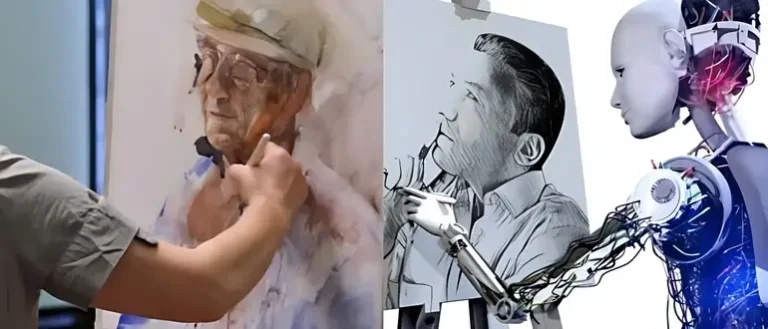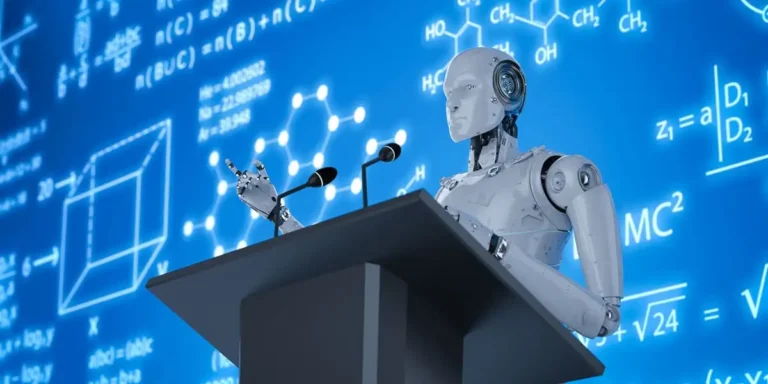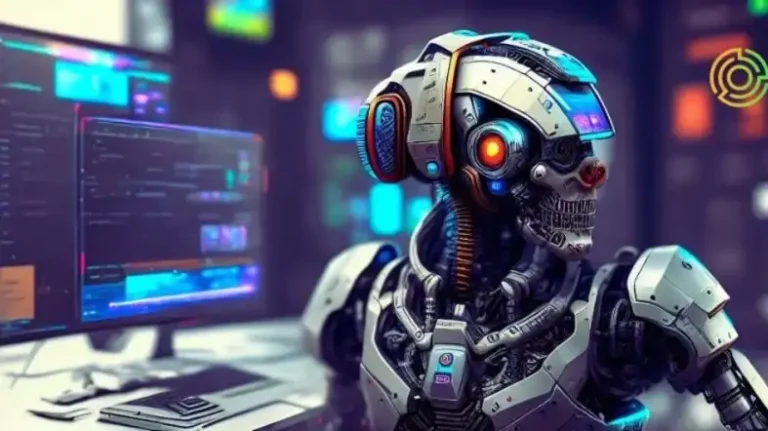The rise of artificial intelligence (AI) has brought about significant changes in various industries, including literature.
With AI’s ability to generate human-like text, many people wonder if it could replace human authors altogether.
In this blog post, we explore the potential of AI in writing and the implications it could have on the future of literature.
Join us as we delve into this fascinating topic and examine the possibilities of AI taking over the role of authors.

Will AI Replace Authors?
No, AI is unlikely to replace human authors in the near future fully. Although AI can help with certain aspects of writing and generate content in specific contexts, it lacks the creativity, empathy, and imagination that drive human writers to create unique and meaningful stories.
While AI can assist writers in generating ideas and research, storytelling is an art that requires complex human traits that cannot be replicated through algorithms.
AI Writing: A Threat or an Opportunity for Authors?

Versatile AI writing tools
Versatile AI writing tools are software applications that use advanced natural language processing (NLP) algorithms to generate written content.
They can produce a wide range of content types, including blog posts, articles, product descriptions, social media posts, and more.
These tools often come equipped with a variety of features, such as customizable templates, suggested headlines, and SEO optimization, which make them very versatile.
Verdict:
Versatile AI writing tools are a valuable resource for authors looking to save time and effort when creating content.
AI-powered content editors
AI-powered content editors are software tools that use machine learning algorithms to analyze and optimize written content.
These tools are designed to help writers create high-quality and engaging content that resonates with their target audience.
They can suggest sentence structure, grammar, spelling, and tone changes and offer feedback on readability, keyword usage, and overall effectiveness.
Verdict:
AI-powered content editors can be a powerful tool for authors looking to improve the quality and effectiveness of their writing.
Editing AI-generated blog posts
While AI tools can be very helpful in generating written content, it is important to remember that they are not perfect.
AI-generated blog posts may contain errors or inaccuracies, and it is still necessary to proofread and edit the content before publishing it.
This includes checking for grammar and spelling errors and ensuring the content is well-written and relevant.
Verdict:
Editing is essential to the content creation process, even when using AI-generated content.
AI writing assistants
AI writing assistants are software tools that help writers generate content by providing suggestions for topics, conducting research, and even drafting and editing content.
These tools can save writers significant time and effort, allowing them to focus on more creative aspects of the writing process.
Verdict:
AI writing assistants can be a valuable resource for authors looking to streamline their content creation process.
Pros and cons of AI writing tools
While AI writing tools can be beneficial, they have drawbacks. One of the biggest cons is that they may not be 100% accurate and may produce redundant or irrelevant content.
Additionally, some writers may feel that using AI tools takes away from the creative process and results in content that lacks a personal touch.
Verdict:
While AI writing tools can be a valuable resource for authors, weighing the pros and cons before using them is important.
Using AI to write blog posts
AI can be used to write blog posts by generating content based on input from a human writer. This input can include topics, keywords, and guidelines for tone and style.
While AI-generated content can be a helpful starting point, it is still important for writers to review and edit the content before publishing it to ensure that it meets their standards.
Verdict:
Using AI to write blog posts can be a helpful tool for authors looking to save time and effort, but it should be used as a starting point rather than a final product.
Academic perspectives on AI writing.
Some academics are studying AI writing’s ethical, social, and fiscal effects.
According to some researchers, AI writing could democratize content creation by making it available to more people, regardless of writing ability.
AI writing tools may also aid language variety and translation.
However, some academics worry that the broad adoption of AI writing tools could displace human writers.
AI-generated content may propagate harmful stereotypes and misinformation, according to some experts.
Verdict:
AI writing has both potential benefits and drawbacks, and it’s important to consider the academic perspectives on this technology to understand its implications better.
Overall Verdict:
AI writing tools offer opportunities and potential threats to authors.
While they can save time and effort, improve writing skills, and generate high-quality content, they also have some drawbacks, such as concerns about job loss and the reliability of AI-generated content.
Therefore, authors must weigh the pros and cons of AI writing tools and use them wisely to enhance their writing process.
Ultimately, AI writing tools are a valuable addition to the writing industry, but they cannot replace human creativity and insight.
What is the impact of AI on the Author’s Job industry?

AI and Writing Assistance Tools
One of the most significant impacts of AI on the author’s job industry is AI-assisted writing.
This technology can help writers with various aspects of their work, including research, grammar, and sentence structure. With AI tools, authors can save time and increase their productivity by automating some of their tasks.
AI-based writing tools can help writers in different ways, from simple corrections of grammar and punctuation to more complex tasks like suggesting synonyms and improving the overall readability of the text.
These tools can help writers to identify errors in their work and suggest improvements, thereby enhancing the quality of their work.
AI-Powered Editing
Another significant impact of AI on the author’s job industry is AI-powered editing. This technology can help editors to identify errors in manuscripts and suggest changes that could improve the quality of the work.
With AI tools, editors can save time and improve their efficiency, making the editing process faster and more accurate.
AI-based editing tools can identify errors in spelling, grammar, and punctuation. They can also provide suggestions for sentence structure and overall readability, helping editors to improve the quality of the text.
Additionally, these tools can provide insights into the tone and style of the writing, which can help editors to provide more accurate feedback to authors.
Increased competition
AI has also created a more competitive environment for authors. As AI tools become more advanced, they can produce high-quality content that rivals human-written content.
This means that authors must continually improve their writing skills and adapt to new technologies to remain competitive in the industry.
New job opportunities
Despite the increased competition, AI has also created new job opportunities for authors. As AI tools become more prevalent, there is a growing demand for authors who can effectively use these tools to generate high-quality content.
Authors who can work alongside AI tools and leverage their capabilities will be in high demand in the future.
The Threat of AI on Creative Writing
Despite the benefits that AI-powered tools bring to the table, there is a growing concern that they might threaten the future of creative writing.
This is because AI can produce content that is similar in style, tone, and structure to human-written content.
As a result, some fear that AI-generated content might become indistinguishable from human-written content, leading to a loss of jobs for human writers.
However, it is essential to note that AI cannot replace the creativity, imagination, and originality that human writers bring to the table.
AI can only assist writers in their work, but it cannot replace them.
The Future of AI and Writing
While the impact of AI on the author’s job industry is significant, it is only the beginning.
As AI technology continues to advance, it is likely to have an even greater impact on the writing industry in the future.
Some experts predict that AI could eventually replace human writers altogether, leading to a significant shift in the job market.
However, it is important to note that AI technology cannot replace the creativity and originality that human writers bring to their work.
While AI tools can assist writers and editors in their work, they cannot replicate the human experience of creating something new and unique.
What Skills Should Authors Learn To Hold Their Job In The Age Of AI?

Creative Writing and Storytelling
Creative writing and storytelling skills are essential for authors to create engaging and compelling content.
AI systems may be able to create content, but they can’t replicate the human touch that comes with creative writing and storytelling.
Authors should focus on developing their creative writing skills to create content that connects with their audience emotionally.
Adaptability to New Technologies
As AI continues to evolve, writers and authors must be willing to adapt to new technologies. They need to be comfortable using digital tools such as automated writing software and online research databases.
Additionally, they must be proficient in using word processing software, graphic design tools, and online publishing platforms.
Data Analytics and Interpretation
With the abundance of data available online, authors must learn to interpret and analyze data effectively.
They need to understand how to use analytics tools to track audience engagement, measure the success of their content, and optimize their writing accordingly.
SEO and Keyword Optimization
Search Engine Optimization (SEO) is a critical skill for authors in the age of AI. They must understand how to optimize their content for search engines and incorporate relevant keywords to improve their online visibility.
This includes using meta descriptions, title tags, and other SEO tactics to ensure that their content is easily discoverable online.
Emotional Intelligence and Storytelling
AI is unlikely to replace human creativity when it comes to storytelling. Authors must be skilled at creating compelling narratives that evoke emotions and resonate with readers.
They need to develop emotional intelligence to understand their audience’s needs and preferences and tailor their content accordingly.
Collaborative Work and Communication Skills
Authors must also possess strong communication and collaboration skills. They should be able to work effectively in teams with other writers, editors, designers, and marketers.
They need to be comfortable giving and receiving feedback and collaborating on projects using online tools and platforms.
Adaptability and Continuous Learning
Finally, authors must develop adaptability and a continuous learning mindset to hold their job in the age of AI.
The technology landscape is rapidly evolving, and authors must be willing to adapt to new trends and technologies continually.
They should also embrace lifelong learning and continuously improve their skills to remain competitive in the market.
FAQs
Are There Any Potential Downsides To Relying On AI For Writing Assistance?
Over-reliance on AI for writing assistance could potentially lead to the homogenization of writing styles and a lack of diversity in storytelling.
Additionally, AI-generated works lack the cultural and historical context that human authors bring to their writing.
Can AI Learn To Mimic The Style Of A Specific Author?
Yes, AI can be trained to recognize and replicate the writing style of a specific author.
However, this is still limited in its ability to capture the author’s unique voice and creative essence.
What Is The Role Of AI In The Field Of Writing?
AI can assist writers in various ways, such as generating ideas, providing suggestions for word choice, and grammar correction. However, AI cannot replace human authors’ creativity and unique voice.
Can AI Write Entire Books?
While AI has shown the ability to generate coherent sentences and even entire articles, it cannot create a story or develop characters with the depth and complexity of human authors.
AI-generated works lack the emotional depth and nuance that only a human writer can provide.
Will AI Completely Eliminate The Need For Human Writers?
No, AI cannot replace the unique creativity, intuition, and imagination that human authors bring to their writing.
While AI can assist in certain tasks, it cannot replace the human ability to think deeply and create complex, emotionally resonant works.
Conclusion
AI has made a lot of progress in the field of language generation, but it won’t be able to replace human authors totally.
Content made by AI lacks the nuance, creativity, and feeling that are essential to writing by humans.
AI won’t likely become a replacement for human writers. Instead, it will likely become a tool that helps and improves their creative process, letting them focus on the more complex and creative parts of writing.





